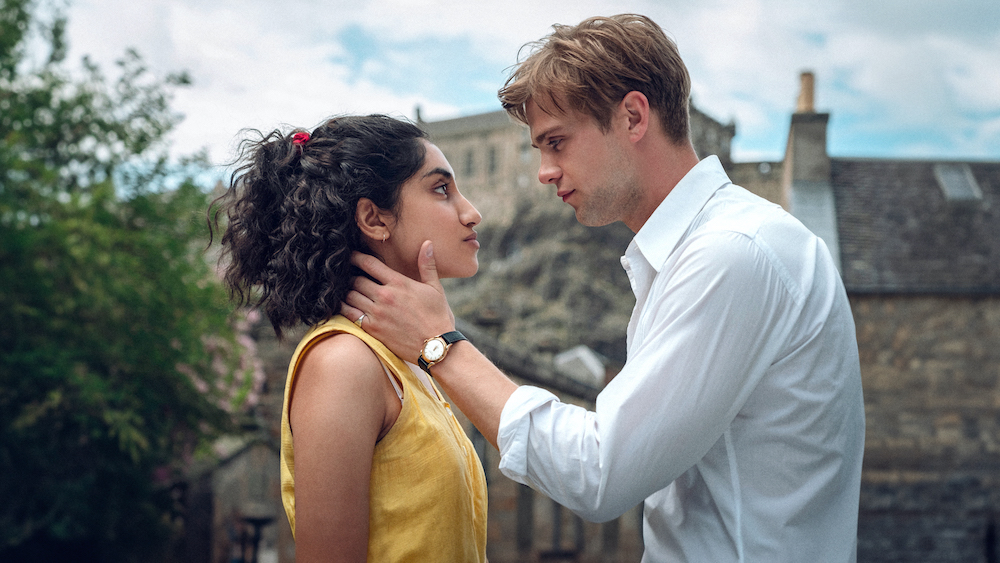Netflix’s ‘One Day’ focuses on the complicated relationship between Emma Morley and Dexter Mayhew. They have an instant attraction the night they first meet, but over the years, their relationship turns more platonic while they both pine away for each other in silence. The ups and downs in their friendship, which stands the test of time, and their own callousness towards each other become the focus. Seeing them evolve over the years is highly realistic and portrayed in the show with a keen sense of relatability for the audience. The timeline of their relationship is also in sync with how things actually progress in real life sometimes. This portrayal is bound to make one wonder if the characters and their relationship are pulled from reality. SPOILERS AHEAD
Emma and Dexter are Fictional But Inspired by Real People

Emma Morley and Dexter Mayhew are fictional characters created by author David Nicholls for his novel, ‘One Day,’ on which the TV show is based. After the novel took the world by storm, the author was frequently asked if Emma and Dexter were based on real people, and he revealed that they weren’t. In fact, it has less to do with a couple’s relationship and more to do with Nicholls’ love for Edinburgh, which is where the story of ‘One Day’ begins.
Nicholls came to Edinburgh in 1988 and immediately fell in love with the city. He spent a summer there while working as an actor at the festival, and the city made a huge impression on him. He would spend a lot of his time wandering around its streets and taking in its beauty and drama, which came particularly alive during the festival, and it stayed with him for the rest of his life. When he eventually sat down to write ‘One Day,’ he didn’t just go back to Edinburgh; he also went back to 1988.
For a story such as this, Nicholls knew that the characters had to feel as real as possible, which is why he made it a point to stay away from the conventional portrayal of a couple in Hollywood movies. He didn’t want to end up writing stereotypes with a “goofy guy” and a “wisecracking girl” who are complete opposites. He noted that women in such stories would usually be “ultra-feminine and obsessed with shopping,” while guys would be “kind of slobby and only ever want to spend time with other men and talk about football.” From his friendships with both men and women, he knew that there was nothing real about this stereotype.
When it came to writing Emma, Nicholls drew a lot from his female friends, who he said “are interested in politics and not that bothered about shoes,” as opposed to the “white-wine drinking, shoe-loving, conservative women” the romance genre was full of at the time. Emma’s character was also easier to write because he felt closer to her in personality than Dexter. Much like his protagonist, Nicholls was interested in writing and worked “terrible jobs” while trying to make a career in theatre and writing.

He revealed that he was also prone to “a lot of anxiety and self-pity and staying in,” like Emma, and much like her life changes after her book is published in the late 90s, Nicholls’s life also took a turn around the same time. The author calls Emma an amalgam of him and his friends and bits of fictional characters like Shirley MacLaine in ‘The Apartment’, Katharine Hepburn, Beatrice in Much Ado, and Annie Hall, among others.
In writing Dexter, he wanted to avoid the stereotyping of men as “beer-drinking, sports-loving, and commitment-fearing,” noting that his own idea of hell is “watching a football match in a room full of drunk men.” Having worked as an actor in the 90s, he knew a lot of men who had good looks and found success early in their careers. Having more money made things easier, and they didn’t shy away from the idea of having a good time. The author described their lifestyle as “quite a wild, hedonistic time in London in the Nineties,” and this is what he put into Dexter’s character to begin with.
Considering all this, it’s clear that David Nicholls didn’t base Emma Morley and Dexter Mayhew on any specific people. Rather, they are both a representation of the different kinds of people he used to know and even was himself in his youth, especially during the 90s. This is why, perhaps, despite being fictional, Emma and Dex feel so real and relatable.
Read More: Does Leo Woodall’s Dexter Die in One Day?


You must be logged in to post a comment.